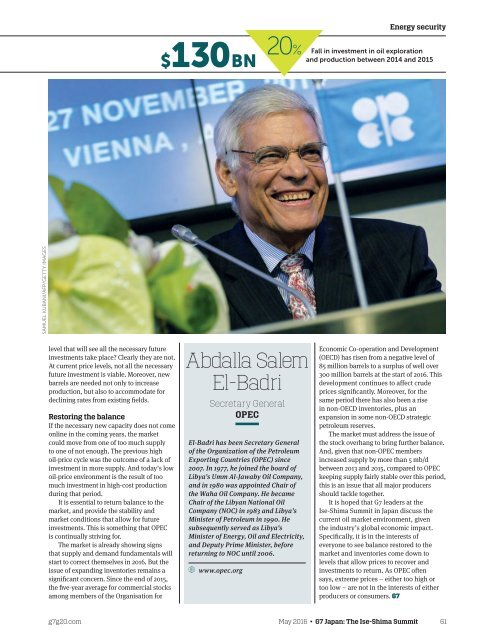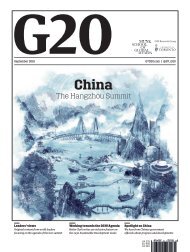G7_JAPAN
Create successful ePaper yourself
Turn your PDF publications into a flip-book with our unique Google optimized e-Paper software.
Energy security<br />
$130BN<br />
20% Fall in investment in oil exploration<br />
and production between 2014 and 2015<br />
SAMUEL KUBANI/AFP/GETTY IMAGES<br />
level that will see all the necessary future<br />
investments take place? Clearly they are not.<br />
At current price levels, not all the necessary<br />
future investment is viable. Moreover, new<br />
barrels are needed not only to increase<br />
production, but also to accommodate for<br />
declining rates from existing fields.<br />
Restoring the balance<br />
If the necessary new capacity does not come<br />
online in the coming years, the market<br />
could move from one of too much supply<br />
to one of not enough. The previous high<br />
oil-price cycle was the outcome of a lack of<br />
investment in more supply. And today’s low<br />
oil-price environment is the result of too<br />
much investment in high-cost production<br />
during that period.<br />
It is essential to return balance to the<br />
market, and provide the stability and<br />
market conditions that allow for future<br />
investments. This is something that OPEC<br />
is continually striving for.<br />
The market is already showing signs<br />
that supply and demand fundamentals will<br />
start to correct themselves in 2016. But the<br />
issue of expanding inventories remains a<br />
significant concern. Since the end of 2015,<br />
the five-year average for commercial stocks<br />
among members of the Organisation for<br />
Abdalla Salem<br />
El-Badri<br />
Secretary General<br />
OPEC<br />
El-Badri has been Secretary General<br />
of the Organization of the Petroleum<br />
Exporting Countries (OPEC) since<br />
2007. In 1977, he joined the board of<br />
Libya’s Umm Al-Jawaby Oil Company,<br />
and in 1980 was appointed Chair of<br />
the Waha Oil Company. He became<br />
Chair of the Libyan National Oil<br />
Company (NOC) in 1983 and Libya’s<br />
Minister of Petroleum in 1990. He<br />
subsequently served as Libya’s<br />
Minister of Energy, Oil and Electricity,<br />
and Deputy Prime Minister, before<br />
returning to NOC until 2006.<br />
www.opec.org<br />
Economic Co-operation and Development<br />
(OECD) has risen from a negative level of<br />
85 million barrels to a surplus of well over<br />
300 million barrels at the start of 2016. This<br />
development continues to affect crude<br />
prices significantly. Moreover, for the<br />
same period there has also been a rise<br />
in non-OECD inventories, plus an<br />
expansion in some non-OECD strategic<br />
petroleum reserves.<br />
The market must address the issue of<br />
the stock overhang to bring further balance.<br />
And, given that non-OPEC members<br />
increased supply by more than 5 mb/d<br />
between 2013 and 2015, compared to OPEC<br />
keeping supply fairly stable over this period,<br />
this is an issue that all major producers<br />
should tackle together.<br />
It is hoped that <strong>G7</strong> leaders at the<br />
Ise-Shima Summit in Japan discuss the<br />
current oil market environment, given<br />
the industry’s global economic impact.<br />
Specifically, it is in the interests of<br />
everyone to see balance restored to the<br />
market and inventories come down to<br />
levels that allow prices to recover and<br />
investments to return. As OPEC often<br />
says, extreme prices – either too high or<br />
too low – are not in the interests of either<br />
producers or consumers. <strong>G7</strong><br />
g7g20.com May 2016 • <strong>G7</strong> Japan: The Ise-Shima Summit 61
















